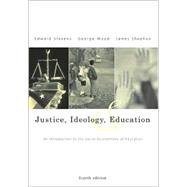| Preface | xiii | ||||
| Acknowledgments | xvii | ||||
| Part One SCHOOLING AND JUSTICE | |||||
|
3 | (23) | |||
|
5 | (4) | |||
|
9 | (5) | |||
|
14 | (8) | |||
|
22 | (1) | |||
|
23 | (3) | |||
|
26 | (31) | |||
|
27 | (4) | |||
|
|||||
|
31 | (2) | |||
|
33 | (5) | |||
|
|||||
|
38 | (4) | |||
|
42 | (11) | |||
|
|||||
|
53 | (4) | |||
| Part Two EDUCATION AND HUMAN DIVERSITY | |||||
|
57 | (34) | |||
|
58 | (7) | |||
|
65 | (6) | |||
|
71 | (5) | |||
|
76 | (9) | |||
|
85 | (1) | |||
|
86 | (5) | |||
|
91 | (28) | |||
|
92 | (6) | |||
|
|||||
|
98 | (5) | |||
|
|||||
|
103 | (6) | |||
|
|||||
|
|||||
|
|||||
|
109 | (7) | |||
|
|||||
|
|||||
|
|||||
|
|||||
|
116 | (3) | |||
| Part Three SCHOOLING AND IDEOLOGY | |||||
|
119 | (20) | |||
|
120 | (1) | |||
|
121 | (2) | |||
|
123 | (2) | |||
|
125 | (6) | |||
|
131 | (4) | |||
|
135 | (2) | |||
|
137 | (2) | |||
|
139 | (30) | |||
|
140 | (4) | |||
|
|||||
|
144 | (3) | |||
|
|||||
|
147 | (14) | |||
|
|||||
|
161 | (2) | |||
|
163 | (5) | |||
|
|||||
|
168 | (1) | |||
|
169 | (46) | |||
|
170 | (15) | |||
|
|||||
|
185 | (5) | |||
|
|||||
|
190 | (14) | |||
|
|||||
|
204 | (8) | |||
|
|||||
|
212 | (3) | |||
| Part Four SCHOOLING AND POLITICS | |||||
|
215 | (20) | |||
|
215 | (2) | |||
|
217 | (2) | |||
|
219 | (2) | |||
|
221 | (2) | |||
|
223 | (2) | |||
|
225 | (6) | |||
|
231 | (2) | |||
|
233 | (2) | |||
|
235 | (59) | |||
|
236 | (4) | |||
|
|||||
|
240 | (4) | |||
|
|||||
|
244 | (11) | |||
|
|||||
|
255 | (18) | |||
|
|||||
|
273 | (19) | |||
|
|||||
|
292 | (2) | |||
|
294 | (43) | |||
|
295 | (7) | |||
|
|||||
|
302 | (4) | |||
|
|||||
|
306 | (6) | |||
|
|||||
|
312 | (5) | |||
|
|||||
|
317 | (17) | |||
|
|||||
|
|||||
|
|||||
|
334 | (3) | |||
| Part Five SCHOOLING AND SOCIAL CHANGE | |||||
|
337 | (21) | |||
|
338 | (3) | |||
|
341 | (2) | |||
|
343 | (3) | |||
|
346 | (7) | |||
|
353 | (2) | |||
|
355 | (3) | |||
|
358 | (67) | |||
|
359 | (4) | |||
|
|||||
|
363 | (10) | |||
|
|||||
|
373 | (7) | |||
|
|||||
|
380 | (5) | |||
|
|||||
|
385 | (13) | |||
|
|||||
|
398 | (14) | |||
|
|||||
|
|||||
|
|||||
|
|||||
|
412 | (10) | |||
|
|||||
|
422 | (3) | |||
| Part Six THE NEW TEACHING PROFESSIONAL AND THE WORKPLACE | |||||
|
425 | (12) | |||
|
425 | (3) | |||
|
428 | (2) | |||
|
430 | (1) | |||
|
431 | (2) | |||
|
433 | (1) | |||
|
434 | (1) | |||
|
434 | (1) | |||
|
434 | (3) | |||
|
437 | (44) | |||
|
438 | (7) | |||
|
|||||
|
|||||
|
445 | (6) | |||
|
|||||
|
|||||
|
451 | (10) | |||
|
|||||
|
|||||
|
461 | (6) | |||
|
|||||
|
467 | (6) | |||
|
|||||
|
473 | (7) | |||
|
|||||
|
480 | (1) | |||
| Index | 481 |








